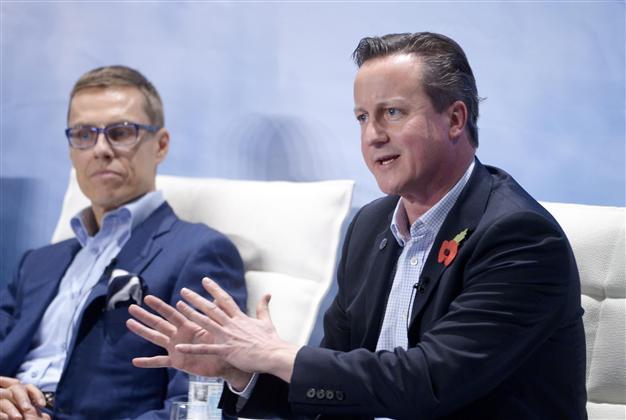Britain claims victory after EU defers budget bill
BRUSSELS - Agence France-Presse

Finland's Prime Minister Alexander Stubb (L) and Britain's Prime Minister David Cameron attend the Northern Future Forum 2014 seminar, held at the Aalto University in Espoo November 7, 2014. REUTERS Photo
EU finance ministers agreed Friday to extend a deadline for Britain to pay a huge 2.1-billion-euro bill until September 2015, with finance minister George Osborne hailing it as a victory in his country's latest showdown with Brussels.
Prime Minister David Cameron had refused to meet the "unacceptable" demand by the original December 1 cut-off, and the new deadline means he will not have to pay before tense general elections in Britain in May.
Osborne said Britain would only pay back half the amount in two instalments next year, because of arrangements involving London's cherished rebate from the EU, but other European sources insisted the amount was the same.
"This is far beyond what anyone expected us to achieve, and it's a result for Britain," Osborne told reporters after a meeting his counterparts in Brussels.
The original bill was based on a recalculation of member states' budgets over several years, but only emerged at a summit in late October, giving Britain only a few weeks to pay up.
France and Germany were set for large payouts under the new rules, while the Netherlands and Italy faced payment demands that were smaller than that of Britain.
A furious Cameron had warned that the budget bill, which emerged suddenly at a summit in October, could cause his increasingly eurosceptic country's exit from the EU in a 2017 referendum.
His Conservative party is under intense pressure from the eurosceptic UK Independence Party ahead of next year's elections, leading him to make a series of increasingly strident demands from Brussels.
Osborne said that Britain would only pay 850 million in two instalments in July and September next year, adding that the rest would be offset against a full upfront payment of the 3 billion annual rebate negotiated by premier Margaret Thatcher in the 1980s.
But European sources said the amount of 2.1 billion euros ($2.6 billion) -- arrived at after recalculation -- would remain the same for now but that it could be renegotiated after the British elections.
"The amount isn't changed," one source told AFP. "The British claim is mixing the amount with the rebate." The source added however that negotiations on the amount could be included in talks on the EU's 2016 budget.
Cameron had issued a fresh warning of trouble ahead as the ministers were meeting in Brussels.
"The two elements that I said were absolutely clear were that we wouldn't pay two billion euros on December 1 and we didn't believe in paying anything like that amount," Cameron said at the Northern Future Forum in Helsinki.
"I hope they can be resolved... and if they can be then that'll be good, and if they can't -- then obviously we'll have a major problem."
The row overshadowed new European Commission chief Jean-Claude Juncker's first week in office, with Juncker accusing Cameron of having a "problem" with other leaders after the British premier brought it up at the October summit.
EU officials have said they are keen to keep Britain in the 28-nation bloc, but there are increasing signs that they are tiring of his demands, which also include limits on immigration.
German Chancellor Angela Merkel reportedly said that immigration curbs sought by Britain are a "red line".
"He is unbearable," one European diplomat told AFP of Cameron after the British leader's comments on the budget bill following last month's summit.
Meanwhile a global tax breaks controversy surrounding Luxembourg and Juncker, who was the tiny EU country's prime minister before joining the Commission, hung over the meeting of ministers in Brussels.
Household names such as Pepsi, IKEA and Deutsche Bank were among companies named by the US-based International Consortium of Investigative Journalists (ICIJ) following a six-month investigation of 28,000 leaked documents.
The European Commission said it was already investigating Luxembourg's tax deals, while a spokesman for Juncker -- prime minister at the time of the arrangements -- said he was unfazed.
